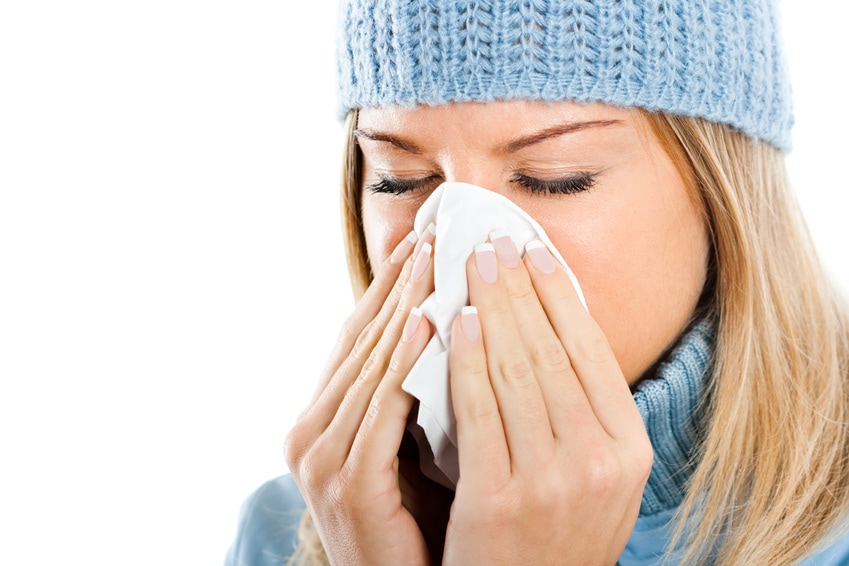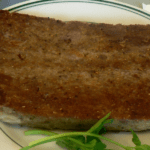10 Tips For Tackling Winter Allergies
So, it's not a cold, now what? We can help you manage your symptoms.

Winter allergies? That’s right. Your itchy, watery, runny, sniffle-y, stuffed-up symptoms usually associated with the emergence of spring and summer may just be the results of a miserable winter season as well.
If you feel any or all of the above for more than a few days or a week (without a fever), or if symptoms appear to go away but come back again, even if the snow is falling your allergies may be in full force. Though pollen and ragweed may be on snooze control, irritants like pet dander, dust mites, mold, and mildew do not necessarily take a seasonal vacation. What’s more, doctors remind us that sinusitis – an inflammation or swelling of the tissue lining the sinuses – can be caused by allergens, not necessarily by a virus or bacteria. And with windows closed tightly and heat blowing all winter, the air inside your home becomes a kind of allergen soup.
Here are 10 ways to help you manage winter allergies and even help you take a preemptive strike against them.
- Believe it or not, according to WebMD, your shoes and boots may be tracking in allergens from decaying leaves and yard waste, especially if there is not a lot of snow on the ground. Find a way to clean them quickly or leave them in a mudroom. (Depositing them on the porch before entering is the best option, but stepping back into frozen boots is not an ideal way to start the day!)
- Who doesn’t appreciate sipping hot cocoa by a roaring fire, or those toasty mornings near the wood stove? But wood stored outside acts like a Petri dish for mold, and bringing it indoors afterwards releases it into the air. Try cutting and immediately storing in a dry place indoors.
- Experts recommend washing your hands and face frequently (actually in any season) to remove allergens. Also, if your allergies are in full swing, shower and wash your hair and wash clothing more often to remove allergens adhering to them. Steam from the shower also helps to open up blocked nasal passages. (NOTE: If your dog is itching, particularly as the temperature begins to rise again, Lewiston, Maine veterinarian Dr. Ruth Burgess recommends bathing him once or twice a week with a soothing aloe pet shampoo to wash away any allergens deposited on his fur, as they build up and irritate him. This, in turn, will also help preclude their being transferred to you when you touch him.)
- Be sure to wash sheets and blankets often, as they quickly collect allergens.
- Pour on (or in!) the water. With dry, heated indoor winter air, experts suggest ramping up your intake of fluids, including water, tea, and water-rich fruits and vegetables. The steam from hot liquids may also provide relief for a stuffed-up nose.
- Vacuum! Vacuum! Vacuum! Even daily isn’t too much when working hard to keep allergens from settling on carpets and flooring. If possible, always opt for flooring (with easily laundered throw rugs, if you prefer) as opposed to extensive carpeting, so allergens have less of a chance of accumulating.
- Moisturize the air. Experts report it’s a balancing act where too little moisture can irritate the nasal passages, but too much precipitates mold and mildew. Humidity should register at between 30 percent and 50 percent. A hygrometer which measures humidity can be purchased for a few dollars, and you can adjust the balance with a humidifier, dehumidifier, etc. Also, purchase saline solution for your nose at a pharmacy and use it dutifully each day to keep nasal passages moist.
- Invest in a HEPA filter, which cleanses the air of particles.
- Try over-the-counter antihistamines or decongestants. Steroidal nasal sprays (some now available without a prescription) have been shown to manage symptoms even better than decongestants. Or, go the herbal or natural route with peppermint tea. The essential oil acts as a decongestant and certain substances in peppermint are thought to be anti-inflammatory.
- Allyl isothiocyanate (mustard oil), found in wasabi and horseradish, encourages mucus flow, so load up on Sushi if you love it or mix with mayo and spread some on your roast beef or turkey sandwich.
Beth Herman
Beth Herman is a freelance writer with interests in healthy living and food, family, animal welfare, architecture and design, religion, and yoga. She writes for a variety of national and regional publications, institutions, and websites.






I keep telling my husband that my dry cough is allergies, since it does come and go. He tries to insist that I’ve got a cold and that I take cold medicines. I am not a medication type gal! I did go to the doctor to confirm it was allergies … yep. I was right!
I sleep with the window open about a quarter inch. It relieves the itchy and stuffy nose I used to wake up with.
Yes, and burning scented candles and using those Glade wax fragrance melts/cubes have exasperated my allergies.